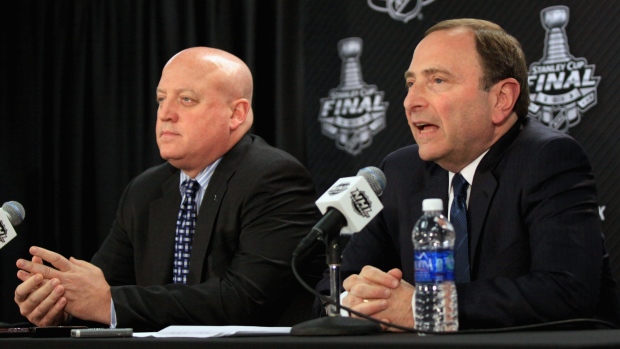May 18, 2016
NHL loses second bid to dismiss concussion lawsuit
A decision in a Minnesota court means former players can continue efforts to examine NHL internal documents and question league and team executives, Rick Westhead reports.

The National Hockey League’s motion to dismiss a class-action lawsuit brought by former players over concussion-related injuries has been rejected by U.S. District Judge Susan Richard Nelson, allowing the former players to continue efforts to examine NHL internal documents and emails and question league and team executives.
The former players are seeking unspecified financial damages and medical monitoring for neurological disorders. Attorneys for the NHL have tried to scuttle the case based on two legal arguments: preemption and statute of limitations.
In March 2015, Nelson, a U.S. district court judge in Minnesota, rejected the NHL’s claim that lawsuits like this one cannot be made so many years after players’ retirements.
On Wednesday morning, Nelson released an order rejecting the league’s claims that its collective bargaining agreement (CBA) with the NHLPA should preempt the claim. The NHL had hoped the case would be argued before the National Labor Relations Board, where any monetary judgments might be lower.
“The pleadings do not support [the NHL’s] argument,” Nelson wrote in her judgment. “Rather, discovery is necessary to shed light on the nature of Plaintiffs’ claims, when those claims accrued, and which—if any—CBAs might be relevant.”
The players, including Bernie Nicholls, Joe Murphy, and Craig Muni, argue the NHL had a duty to inform players that repetitive head trauma could lead to long-term brain injuries. Moreover, the players contend the NHL promoted and profited from fighting and violence.
“District Judge Nelson's order denying the NHL's motion to dismiss on preemption grounds is a historic decision in American sports and labour law,” Stuart Davidson, a lawyer for the former players, wrote in a statement sent to TSN on Wednesday.
“Thousands of retired NHL players continue to suffer from the effects of head injuries suffered on the ice. The time is now for the NHL to take a leadership role in the international game of hockey and strive to ensure that retired players and their families receive the assistance they need and that the parents of youth hockey players receive truthful information about head trauma.”
Forbes first reported news of the judgment on Monday while it was still under a sealing order issued by the court.
While the NHL has argued in court filings that it negotiated health and safety issues with the NHLPA and that they are subject to the league’s CBA, Nelson noted that NHL deputy commissioner Bill Daly has also publicly claimed that the league can make rule changes independent of the NHLPA.
“Mr. Daly also commented in a news article and in an email to the players’ union that the NHL Board of Governors can enact rule changes without the players’ union’s approval,” Nelson wrote. “According to Plaintiffs, these documents show that a duty of care exists outside the CBA.”
Nelson also noted that the plaintiffs in the case are retired players who are no longer subject to collective bargaining.
Nelson’s judgment is a major victory for the former players, who first filed their lawsuit in October 2014.
As a class-action complaint, the litigation effectively covers an estimated 5,000 living former NHL players. Nicholls, Dan LaCouture, Mikel Peluso, Gary Leeman, Dave Christian and Reed Larson are the former players serving as six class representatives.
Legal experts had said they expected Nelson to deny the NHL’s motion. The experts said it was unlikely that she would have allowed months’ worth of discovery, costing millions of dollars in legal fees, if she intended to dismiss the case.
Dionne Koller, director of the Center for Law and Sport at the University of Baltimore School of Law, said the judgment in the NHL case is noteworthy because it allows discovery to continue.
“It's far from over and this case can still be dismissed at a later time, but it's important for the plaintiffs that this litigation hasn't been stopped in its tracks,” Koller said in an interview. “Discovery, even if it's targeted to issues like player injuries and the CBA, will turn up more important information for the players.”
Besides legal fees and any possibility of a monetary judgment, Koller said the NHL faces the risk of a tarnished brand.
“Image for a pro sports league is pretty important,” she said. “The longer this case stretches on, the more the NHL sends a message that it's being callous towards its former players and callous towards the game. It just looks like the league doesn't care about the health of all of its former players.”
It’s unclear whether the judgment might change the NHL’s position on negotiating a settlement with the former players.
According to an NHL memo, distributed to the board of governors in October 2015, league executives said there was no “smoking gun” that offers the former players the prospect of winning the concussion lawsuit.
“While recent signals suggest plaintiffs are anxious to begin settlement discussions (similar to what transpired in the NFL), we have indicated to them no desire to engage in such discussions, primarily because we feel so strongly in the merits of our case and the leadership role (among all sports leagues) we have taken in the study, prevention, diagnosis and management of concussions,” the NHL wrote in its memo, which was obtained by Yahoo Sports.
The NHL is continuing to take depositions of former players who are suing the league. Further discovery is expected to take place in coming months, with meetings to update the court on the progress of the case scheduled through December 2016.

